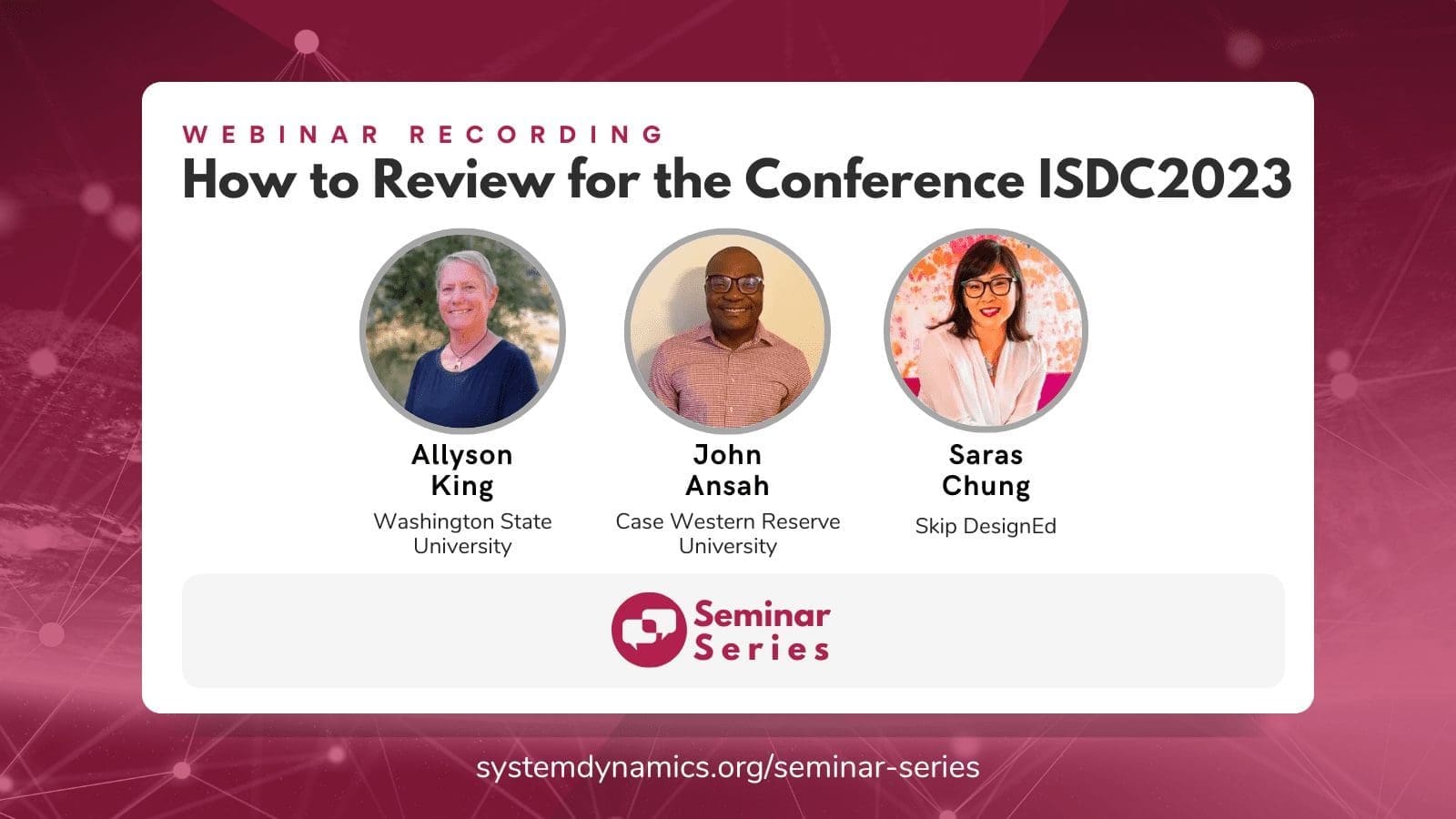How To Review for ISDC 2023
Reviews provide valuable feedback for authors, offering new perspectives and posing insightful questions to help them improve their work. They can inspire authors to think more deeply about their research, while also exposing reviewers to new ideas and honing their critical evaluation skills. Helpful reviews can also motivate newcomers to the field and foster a sense of belonging within the System Dynamics community. Through the use of reviews, the program committee is able to thoughtfully place work within the broader conference program, allowing for authors to engage with their peers and build a sense of community among those working on similar topics. Conference attendees can then benefit from attending more cohesive and engaging sessions, ultimately leading to a more productive and fulfilling conference experience.
Do you want to become a conference reviewer or improve your reviews? Here are ten tips to write a great review.
Ten Reviewing Tips
1. Don’t be intimidated by the review process. It’s a terrific experience that can help you develop your own critical evaluation skills and expand your knowledge of the field.
2. Start early and don’t rush through the work. Take your time to read and evaluate the paper thoroughly so you can provide constructive feedback to the author.
3. Remember that reviews are not about accepting or rejecting work; they’re about providing feedback and suggestions to help the author improve their work.
4. Be courteous and respectful in your review. Start with a positive comment, summarize the paper, and offer constructive criticism and suggestions for improvement. If you have a different view of the paper, explain your perspective in a respectful way and provide additional resources that might be helpful to the author.
5. If you find yourself struggling to understand a section of the work, don’t assume it’s your fault. Ask the author to clarify the section or explain it in simpler terms for a broader audience.
6. When evaluating the work, pay attention to the assumptions, feedback structure, and parameter values. If it’s not clear how structure relates to behavior, ask the author for more clarification.
7. If your strength lies in theory or practice rather than modeling, your unique perspective will be a great contribution to the author. Consider adding notes to the program chairs to let them know what your strengths are.
8. Make sure you’re familiar with what was asked of the authors in the submission instructions. This will help you evaluate the paper more effectively.
9. Avoid providing unhelpful feedback in your review. Don’t simply summarize the paper without offering any suggestions for improvement. Don’t attack or threaten the author, and don’t be rude or condescending. Systems thinking based papers should be treated as complete papers and not regarded as lesser work for lack of simulation. Slamming the door on the author is not productive; if the paper is not a good fit for the current conference, the author can improve for next year’s conference.
10. Can you volunteer to review a paper if you’ve submitted one of your own? Absolutely! You will not receive your own paper to review. Further, the review process is blind, so you won’t know any author’s identity.
For other conference review questions, contact the conference team.
Student-Organized-Colloquium (SOC) reviews are processed separately. To review for SOC, sign up here.
Watch the recording below
About the Speakers
Allyson Beall King, John Pastor Ansah and Saras Chung are ISDC 2023 Program Chairs.
Recent Posts
Society Governance Updates
New System Dynamics Society leadership
Call for Presenters: Seminar Series
Share your insights in the System Dynamics Society Seminar Series. Submit your proposal and join a global community of experts
Honoring Excellence: A Glimpse into the Awards of the International System Dynamics Conference
Dive into the prestigious awards and honorable mentions of the International System Dynamics Conference, celebrating trailblazers and emerging talents in the field
Upcoming Events

2024 International System Dynamics Conference
The International System Dynamics Conference is coming to Bergen! Save the date: August 4-8, 2024. We hope to see you there! #ISDC2024
Recent Business cases
System Dynamics Helps Evaluate Anticipatory Action on Cholera Outbreaks
Humanitarian agencies encourage anticipatory action in disaster response to cholera outbreaks in the Democratic Republic of Congo.
Management Design for Planted Forests in Japan Using System Dynamics
Hanno City in Saitama Prefecture used a system dynamics model to enable detailed analysis of labor requirements and changes in forest conditions.
Solving Bottlenecks in Dairy Production Facilities with System Dynamics
FriedslandCampina employed system dynamics to strategically enhance production efficiency in the midst of factory merging.


